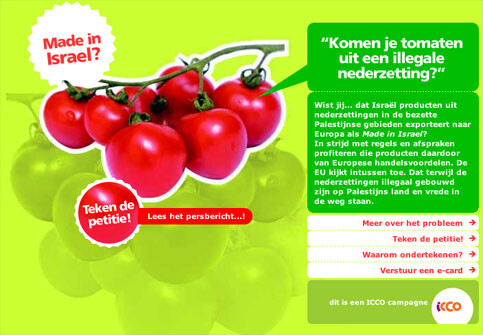17 May 2004

The campaign website of Made in Israel?
Today ICCO, a Dutch development agency, launched the “Made in Israel?” campaign, aimed to highlight the unlawful import of products from Israeli settlements in the occupied Palestinian territories. Last year, Denmark ICCO’s sister organisation DanChurchAid launched a similar campaign.
The reason for the campaign is that products produced in the illegal settlements in the occupied Palestinian territories are exported and marketed as “Made in Israel”. This is a violation of the trade agreement between Israel and the European Union. The agreement exempts Israeli products — but not settlement products –- from import duty. In practice, settlement products continue to benefit from the preferential European trade agreement. The EU and its Member States are aware of Israel’s violations of the Association Agreement, which is based on a policy that treats the settlements as being part of Israel. Yet, so far the EU has failed to take measures which would exclude settlement products from the preferential trade agreement, and the status quo continues to reinforce the economic viability of Israeli settlements.
Settlements are illegal according to international (humanitarian) law and are a source of human rights violations and constitute an obstacle for peace.
Currently, consumers do not know if goods purchased from Israel are made in settlements. False labels mislead consumers and violate their right to a free and well-considered choice. To reach as many people as possible, 100,000 “Boomerang cards” (free postcards available in public places) are being disseminated in the Netherlands, along with thousands of flyers.
A Dutch language website has been launched: www.made-in-israel.nl. On the website, an online petition is available along with to background information about settlements, the EU-Israel Association Agreements, and frequently asked questions about the issue.
ICCO calls on all people who do not support Israel’s settlement policy, or the violations of the Association Agreement, and who expects the Netherlands and the EU to stop these violations, to sign the petition. The petition with a list of supporters will be handed over to Dutch Foreign Minister Ben Bot and the EU Commissioner for Internal Market, Taxation and Customs during the Dutch Presidency of the European Union.
Related Links